The best binoculars for astronomy will enable you to take a spacewalk from the comfort of your lounge chair on a clear night without having to leave the earth,
However, to get the best experience, you must choose a binocular that fits the bill in every way.
There are numerous features and binocular models to consider, but we have narrowed it down to enable you to choose from the best Astro binoculars in these reviews.
Top Astronomy Binoculars For 2024
Which Magnification is Best for Astronomy Binoculars?
With a good pair of 10×50 binoculars, the stars in the sky can be observed. The 10x magnification is enough to get a good overview of the starry sky and to locate constellations. The 50 mm lens diameter allows enough light to have an optimal image even at night. A pair of binoculars with the value of 10×50 is excellent for astronomy.
Those of you who like to enjoy deeper glances in the starry sky should stick to a larger magnification, like, for example, 15x, 20x, or even 25x fold magnification, with an objective diameter of up to 50mm or 80 mm, which are considered ideal binoculars for astronomy.
These models’ disadvantage is their greater weight, and a tripod is usually required for such magnifications. Good tripods are readily available for around $20 or opt for a pair of binoculars with an image stabilizer.
Key Features of Astronomy Binoculars
- At least a 10x magnification.
- At least one objective diameter of 50 mm.
- For models with 15-30x magnification or more, a tripod should be used.
Can You See Planets with Astronomy Binoculars?
First, we need to state that with a good pair of binoculars for astronomy, you can observe exact details on planets, such as with a good telescope.
You can observe stars and even entire star clusters; even galaxies are easy to spot.
These great astronomical binoculars will make it much easier for you to view the planets in our solar system, such as Venus, Jupiter, Mercury, Mars, and others.
Astronomy Binoculars vs. Telescopes
The handiness is the most significant benefit of the Astro binoculars over the telescope. Telescopes are usually very heavy, less compact, and more difficult to stow.
It is different with a pair of binoculars, which are quickly stowed away in the bag, so you do not have all that luggage if you want to travel.
Another advantage is that you usually do not need a whole set of equipment to observe and start monitoring right away.
Astronomy binoculars with relatively small magnifications, such as 10x, can also be used well for nature observations without using a tripod.
With a steady hand, you can do without a tripod, even with larger magnifications. It is not limited to astronomy.
Reviews of the 7 Best Binoculars for Astronomy
1. Barska Waterproof Cosmos Binoculars 25×100
– Best Terrestrial Binoculars.
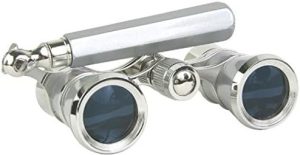
The Barska 25×100 Cosmos binocular is referred to as the best terrestrial binocular for a reason. If you want to experience sights out of this world and enthrall yourself by taking cognizance of the enormity of the universe and the world around you, you need this binocular.
The Barka 25×100 cosmos is perfect for both astronomical viewings and long-distance terrestrial observations in low-light scenarios.
This is not surprising given its features of high-powered magnification capacity with super-large objective lenses and premium optics. Such features and its excellent qualities of precision and strength are why it is the best terrestrial binoculars.
The Barska 25×100 features an aluminum body to reduce weight and a fantastic tripod mounting post. It is entirely fog proof and waterproof as well, ensuring long-term durability. The Cosmos also is backed by Barska’s limited lifetime warranty.
- High power magnification
- Complete waterproof and fog proof.
- Superb qualities of strength and precision.
- Very comfortable on the hands.
- They’re pretty pricey.
2. Celestron 15×70 SkyMaster Pro Binoculars for Astronomy
– Best binoculars for stargazing.
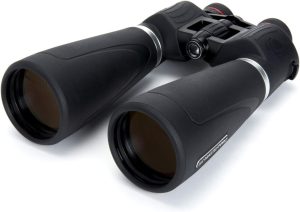
Celestron is well-known for producing great binoculars for astronomy at very reasonable prices. The SkyMaster 15 × 70, sold for around 80$, is probably the best binocular for stargazing and the most popular in the SkyMaster series.
The Skymaster astronomy binoculars offer optimal light intensity thanks to the large lens diameter of 70 mm. These binoculars can be used during the daytime or dark, with this lens diameter value and the 15x magnification.
Compared to other binoculars for astronomy, an advantage of these binoculars is the relatively low weight of 1.36kg, which can easily be 2kg in different models. Also, a large field of view of 77m to 1000m is excellent value with this magnification.
The binoculars can be used without a tripod (if you have a steady hand), so they are not a problem even for nature observations. They are simply the best binoculars for stargazing but are more pleasant to use with a tripod as this ensures a wobble-free image.
A matching tripod adapter is included in the delivery. The center drive serves the focus, which is very easy to use. It is also impressive that the Skymaster 15×70 has good color fidelity, usually not with cheap binoculars.
Celestron astronomy binoculars are a great alternative and excellent binoculars for astronomy, for anyone who wants to save money and demand the best possible quality.
- Tripod mountable.
- Very light weighted, thus comfortable on the hands.
- Excellent day and night viewing quality.
- Holding this binocular steady for long periods with the hands is difficult. The apparent reason is the large objectives.
3. Celestron SkyMaster 25×100 ASTRO Binoculars
– Best binoculars for sky watching.
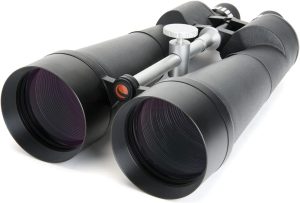
This astronomy binocular from Celestron also comes from the SkyMaster series. In particular, the large lens diameter of 100 mm, together with an incredible 25x magnification, makes it the best binocular for sky watching and ensures an optimal observation of the stars in the sky. It is also remarkable that these binoculars have a larger objective diameter than some smaller telescopes.
Astronomy binoculars reach their full potential with a tripod, and a weight of 4000g, can hardly be held during observation for their best benefit. Suitable tripods can be found on Amazon already, about 15 to 20. You should make sure that the tripod can also hold the weight. The built-in tripod adapter is located on the center drive and, of course, fits on all standard tripods.
The SkyMaster 25 × 100 has to withstand a lot of weight, so the metal bar in the middle with the tripod adapter also serves as reinforcement, as well the case is reinforced and waterproof. In addition to the strap, the accessories include a practical nylon bag which is very sturdy to withstand this heavyweight and can be your backpack.
The binoculars are fascinating for anyone who wants to see even deeper insights into the starry sky, and hence they are considered the best binoculars for sky-watching. This binocular is not very handy, and a tripod is necessary to observe optimally, but the investment is also worth it!
- Waterproof
- Tripod mountable.
- Ideal for eyeglass wearers.
- High performance at an affordable price
- It’s very heavy on the hands.
4. Celestron SkyMaster 25×70 Binoculars
– Best binoculars for planet viewing.
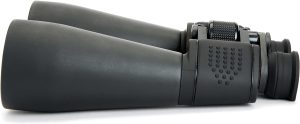
Celestron’s Skymaster, with a proud 15x magnification and a 70 mm front lens diameter, is a popular model among Astro binoculars and the best binoculars for planet viewing. Compared to the 15×70 model, this binocular has a higher magnification with the same aperture, allowing for a deeper look into the night sky, even at higher magnification.
Thanks to its 70 mm front lens diameter, astronomical binoculars collect almost twice as much light as binoculars with a 50 mm objective diameter. So lots of light must be captured to get optimal picture quality. High-quality BAK-4 prisms and a multi-layer coating of the lenses support the whole thing.
The Celestron Skymaster 25×70 binoculars weigh almost 1500g and have a very high magnification. You should grab a tripod to get the full potential out of these binoculars and make watching even more enjoyable. A tripod adapter is already included, like a nylon bag for transport, a strap, and a dust cover.
If you like deep insights into the night sky, you will definitely be interested in this Celestron model.
- Optimal quality images, especially when exploring the night sky.
- It’s tripod mountable.
- Very affordable.
- It’s straightforward to focus.
- Just as you’d expect, these are really bulky too.
5. Orion Giant View 25×100 Astronomy Binoculars
– Best binoculars for space viewing.
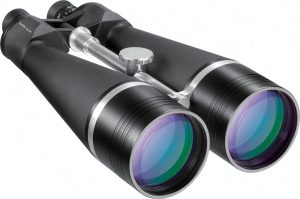
The Orion giant View binoculars are considered to be the best binoculars for space viewing, and this device offers an awesome light-gathering ability for space viewing.
It allows viewing objects in space with exceptional contrast like no other. This pair of binoculars has a wide field of view, long-range distance, and exceptional resolution. It’s quality BAk4 prism and the well-designed internal baffling offer a sharp and attractive image view.
The barrels are reinforced with aluminum rods and objective cell cuffs for maximum structural rigidity. It also features 25x magnification, a 100mm objective lens, and fully multi-coated optics. Because of its high magnification and size, you must use a tripod for convenience.
This binocular is friendly to eyeglass wearers because of the eye relief it offers. It also comes with a heavy-duty briefcase for easy transport and storage.
- Higher magnification.
- Wide field of view.
- Friendly to eyeglass wearers.
- It comes with a hard case for easy transport and storage.
- Fully constructed from high-quality materials.
- It always requires the use of a tripod due to its enormous size.
6. Olympus Trooper 10×50 DPS I Binocular
– Best 10×50 binoculars for astronomy.
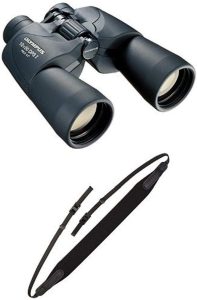
The Olympus 10×50 binoculars produce sharp, bright, and razor-dimensional optics of excellent quality. The 65° angle of view offers a panoramic and linear field of view of about 345 feet. The Olympus is fit for both low-light (dusk, night, or at dawn) and daylight viewings.
This binocular features the BAK7 lens systems, 10x optical power, rugged and high-quality rubber coating, 5mm exit pupil, and Porro prism design.
These features allow the 10×50 to produce images with excellent sharpness, improved brightness, and clarity. If you need the best binoculars for astronomy, I suggest you consider the Olympus Trooper 10×50 DPS.
This excellent pair of binoculars protects your eyes against UV radiation. The trooper 10×50 DPS is an excellent Astro binocular and is great for other outdoor activities such as bird-watching, watching sports events, and even hiking.
- Produces sharp and efficient 3D images.
- Well adapted to both daylight and low-light viewing.
- Very efficient for viewing fast-moving objects.
- UV Ray Protection.
- High-quality images
- Few complaints about blurriness at the edges of the field of vision.
7. Orion 10×50 E-Series Waterproof Astronomy Binoculars –
Best Celestial Binoculars.
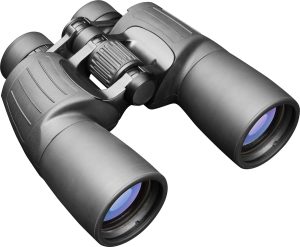
The great Orion 10×50 is the best celestial binoculars featuring 10x magnification and a 50mm objective lens together, giving beautiful views during the daytime and night.
The BAK4 Porro prism, 19mm eye relief, and multi-coated optics deliver bright, clearer, and comfortable views. The Orion 10×50 binocular gives a spectacular view, and you don’t need to worry about rain, snow, or damp weather conditions as it is fully fog proof and waterproof.
The 10×50 binocular offers an amazing view of star clusters, comets, and the moon. One outstanding feature of the Orion 10×50 binocular is that it is suitable for daylight and night use.
The Orion 10×50 binocular is the best option if you want the best celestial binoculars. At 10x magnification, this binocular gives a better image view than the typical 8×42 or 7×50 binoculars of its kind.
They can be comfortable for use with the hands for daytime use or stargazing and attached to a tripod for better stability. We recommend you try this binocular set to get that perfect space view.
- They are fog proof and waterproof.
- Produce high-quality images.
- Good during daylight and low-light viewing.
- Fully constructed with 100% quality materials.
- Very easy and comfortable to use.
- Not very good for viewing fast-moving objects.
Astronomy Binoculars Buying Guide
What to look for when choosing the best Astro binoculars for your night sky needs and some fundamental features to look for
The Angle of View/Field of View.
The field of view determines the width of your image. This denotes the portion of the sky you can cover for astronomers when you target your binoculars at the stars. You should note! The wider the angle/field of view, the more sky you can capture.
Usually, powerful binoculars with high magnification tend to have a slender field of view and vice versa. However, Great Astro binoculars will possess a wide field of view and good magnification.
Proper Magnification for Astronomical Binoculars.
Because the stars, the moon, and galaxies are very far away, your choice of binoculars for astronomy might have to be those with higher magnification. Higher magnification also means an unstable image since every slight hand movement is magnified 10x, 15x, or even 20x times.
You will need to buy some lower magnification binoculars (like 10x) or get a tripod to use with them.
Objective Lens Size
This is the most significant feature of the best binocular for astronomy, together with magnification. The larger the lens, the more light gets in and the brighter your image. Binoculars for astronomy should be at least 50mm to 70mm and above. In astronomy, binoculars are very commons with larger lenses of 50mm to 100mm, mainly because they can amass more light.
Are They Waterproof?
Sometimes water condenses on your binoculars, and at times you accidentally drop them overboard, or it rains. Consider buying waterproof binoculars depending on how, when, and where you plan to use them.
Conclusion
These reviews have noted all the major points to consider when finding the ideal binocular for astronomy.
Regardless of how you look at the skies, whether by the unaided eye or with a pair of binoculars or a telescope, you will find the night sky is truly an extraordinary place to explore. We highly recommend that you use a binocular; all you need to do is hope for clear night skies to explore the universe with a pair of the best binoculars for astronomy.
Leave a Reply